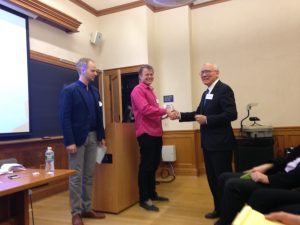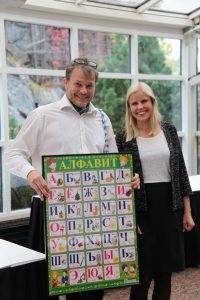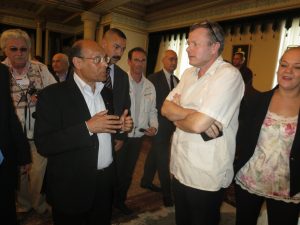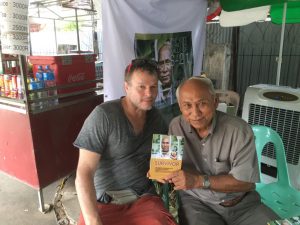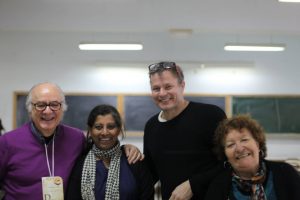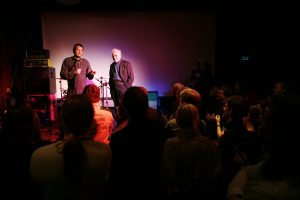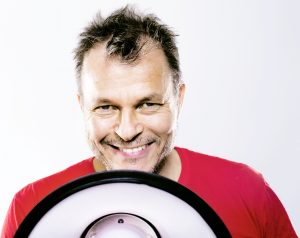
Professor of World Politics, University of Helsinki
As Professor of World Politics at the University of Helsinki, I teach the doctoral thesis seminar in world politics, MA thesis seminars in world politics, and the intro course of world politics.
My current research includes transnational social movements, global political economy and theories of democracy. My specific projects include transnational political representation, contradictions between liberalism and capitalism, as well as book project on the history of the Swastika symbol in Finland (see the separate section on my Swastika research).
I have published many books and articles on Latin America, but in 2017 I also wrote a book on Finland to understand my own country a little better. This has grown into a deepening fascination I have with Finnish history and politics.
I participate in public debates through various channels. I regularly appear in TV and radio programs, and my interviews range from the New York Times, Financial Times or Xinhua News to smaller media outlets in various parts of the world. I am also active in social media.
To learn more about me, you may also want to check different sections of my other blog. It has an easy name teivo.net. You can also explore my academic interests and download for free various publications of mine at my academia.edu site
***
One recent news is that in 2022 the International Political Economy Section of the biggest academic organization of my field, the International Studies Association, gave me the Outstanding Activist Scholar Award.
Awards are surely nice. In October 2015, together with Matti Ylönen, we received the Amartya Sen Prize at Yale University. It was for our article Politics of Intra-Firm Trade. The article was later published in the journal New Political Economy and it can be downloaded for free here.
Receiving the Amartya Sen Prize with Matti Ylönen at Yale University, 2015
My first major award was the American Sociological Association’s Terence K. Hopkins Award, which I got for the best dissertation in the field of political economy of the world-systems in 2001.
My other awards include Academy of Finland’s Recognition Award, University of Helsinki’s J.V Snellman Award and, perhaps the dearest of them all, Pro-Feminism Award given by the feminist organization Left Women.
In 2013, I recieved the Ovet Award for advancing knowledge about Russia in Finland. The main reason was my proposal to include Cyrillic Alphabet in the curriculum of Finnish schools.
Receiving the Ovet Award at Aleksanteri Institute (University of Helsinki) for my proposal to teach Cyrillic Alphabet in Finnish schools, 2013
***
My permanent full professorship has included periods of intense administrative dedication, especially when I was Head of the Political Science Department. In 2014-2016, however, I had the luxury of spending two academic years as Research Director at Helsinki Collegium for Advanced Studies.
My main project in 2014-2016 was on global non-state representation. Some themes of the project are very briefly expressed in this short piece on Occupy Representation. You can also read something on the project at the site of the Helsinki Collegium.
Let me highlight here two publications on non-state representation in world politics. One is Representation Beyond the State: Towards Transnational Democratic Non-state Politics, coauthored with Silke Trommer, in the journal Globalizations in 2017. It is available through open access for free here.
The other one is my contribution Occupy representation and democratise prefiguration: Speaking for others in global justice movements that appeared in a special issue of the journal Capital & Class. The latter should be open access for some time, but if not, you can find a copy of the article also here.
Apart from the more theoretical research on global political economy and transnational social movements, I spent much of 2014-2016 working in and on Brazil. Throughout 2014 I was Visiting Professor at State University of Rio de Janeiro. I also gave talks in various parts of the country and by 2015 I completed visits to all the 26 states of Brazil.
The main result of the research on Brazil was the book Brasilia, coauthored with Maria Manner and published by Siltala in 2016. In the book we focus on politics, ethnic relations and political economy of the country during the past two decades, though we also explore more long-term historical processes.
In 2017, I published my first book on Finland, Maailmanpoliittinen kansalliskävely. One of the themes was to what extent coloniality and colonialism are concepts that can be useful for understanding history and future of Finland. Even if it was published in Finnish, one of its chapters, on the use of the Swastika by Finnish Air Force today, received attention by some international media.
Below I will try to give you an idea of my more general research projects and interests over the past years. I look forward to hearing any suggestions or other kind of feedback related to these issues.
Economism and property rights
A significant part of my early research was related to contradictions and tensions between global capitalism and democracy. In various publications I have used the concept of economism to analyze practices that have shielded economic spaces from democratic claims.
One piece that describes my early interests on the topic quite well is called Overcoming Economism, published in Review (yes, the name of the classical journal edited by Immanuel Wallerstein was simply that).
I am also quite happy about this early article of mine that was published in the inaugural number of Passages: Journal of Transnational and Transcultural Studies. The journal was started with great expectations but it later died out, so the piece is difficult to find except here: Globalization of Economic Surveillance: The International Monetary Fund as a Modern Priest.
The book based on my dissertation, Enter Economism, Exit Politics, also tells story about Latin American debt crisis and Peruvian political economy. If in a hurry, you can just read the foreword by Immanuel Wallerstein or the back cover comments (yes, I am happy Ulrich Beck called it “An excellent case study, a great book.”).
One of my key interests in this field today is around property rights. During the coming years I plan to work seriously on economism, especially through the concepts of liberty and property.
Global democracy and social movements
Over the past decade, much of my work has centered on the possibilities of global democracy and on social movements seeking democratic transformations. One dimension of this work is the search for analytical concepts and theoretical tools to explore (what I provisionally call) the global political.
Some of my publications deal with these questions in and around the World Social Forum. The above-mentioned project on global non-state representation is in many ways continuation of this work. One article you might want to have a look at, if interested in these things, is the one I wrote for a book edited by Stephen Gill for Cambridge University Press. You can download it here: Global Democratization without Hierarchy or Leadership? The World Social Forum in the Capitalist World.
For earlier publications on global democracy and social movements, I also collaborated with my colleague Heikki Patomäki such as our article in Review of International Political Economy titled Critical Responses to Neoliberal Globalisation in the Mercosur Region. Roads to Cosmopolitan Democracy? and our book called A possible world: democratic transformation of global institutions.
The book was later translated into Spanish, Finnish and Arabic.
See also our coauthored piece on the World Social Forum that appeared in the journal Theory, Culture & Society.
Participatory research on social movements may sometimes lead to debates with the state. Here discussing the role of international financial institutions with Tunisia’s president Moncef Marzouki at his palace in 2013, during the World Social Forum.
Global political economy
In global political economy, I still feel at home in world-systems theory and neo-Gramscian transnational historical materialism, but also try to learn from various post-Keynesian and Marxian (or Marxish) approaches. Especially when I was first the program chair and then the section chair of the International Political Economy section of the International Studies Association, I realized what a great variety of political-economy apoproaches exist and how much there is to learn from many of them.
I consider feminist approaches important for global political economy. This is not only for including gender but also because they often offer wonderful analytical insights for thinking politically about apparently non-political things (such as patriarchal family or capitalist economy).
I have also sometimes called my own approach politics of economism rather than political economy. When I was teaching at the Department of Economics at the Catholic University of Peru, I semi-officially renamed my political economy course as very political economy. Ever since, I have been using the concept of very political economy, even if it sounds better in Romance languages. I did so most recently in a talk at Sussex University and in a publication on economy and morality in Finnish
Corporate Social Responsibility
Politicization of corporate power is one of my favorite topics. I have for a while thought that the doctrine of Corporate Social Responsibility (CSR) is an important aspect of making visible the inherently political nature of the economic sphere. I was slightly amused when I realized that Milton Friedman had actually made a similar point long before me. It seems I agree with Friedman on that corporate responsibility can be a subversity doctrine, though we disagree on whether the subversion would be desirable.
In 2013, I published a short book in Finnish about the Impasse of Corporate Responsibility. Some of the ideas can be seen in this short text in English about Milton Friedman’s Argument about Socialist Implications of Corporate Social Responsibility.
An earlier contribution of mine that deals also with corporate power appeared in the Journal of World-Systems Theory and is titled Towards a Democratic Theory of the World-System: Democracy, Territoriality, and Transnationalization.
I hope to continue working on the corporate responsibility issue, so all comments on the theme are particularly welcome. I presented some ideas in English about corporate power also in this rather nicely produced Helsinki University Think Corner video in 2013 as well as in this intervention at the Left Forum in New York in 2011 (my part starts at 1:55).
Human rights and truth commissions
Truth commissions and other mechanisms of dealing with past human rights violations has also been one of my research themes over the past years. I have also done some practical work on them, consultancies and a fascinating gig as advisor at the Peruvian Ministry of Justice to help them formulate a law for a truth commission. I had previously done work on truth commissions in many countries, so it was fascinating to participate in the emergence of new one. On my previous research, you can have a look at my article Truth, Justice and Legal Impunity: Dealing with Past Human Rights Violations in Chile.
I am particularly fascinated by contradictions in the globalization of human rights, for example why and how various truth commissions have dealt with (or typically not dealt with) attributing responsibilities to transnational or external actors.
With Tuomas Forsberg, we had a fascinating project, commissioned by the office of Martti Ahtisaari (ex president of Finland and Nobel Peace Laureate, in which we explored what kinds of lessons national truth commissions may offer for global questions such as transnational slavery or debt crisis.
One result was this publication: Past Injustice in World Politics. Prospects of Truth-Commission-Like Global Institutions. I obviously think the piece has various insights worth reading, but if you are in a hurry you could just read the foreword that Desmond Tutu wrote for us.
I am also interested in how and why the dichotomy between political and civil rights and economic and social rights can be utilized to depoliticize capitalism (yes, this is also related to my project on property rights).
In 2016, my interest on how to deal with past human rights violations also took me to Cambodia to interview Chum Mey, one of the very few survivors of the infamous Tuol Sleng prison.
Poststructuralism, anarchism and liberalism
Deconstructive insights, related to poststructuralism, have always fascinated me, especially if combined with political economy (this is probably why I enjoy reading Hardt and Negri).
I consider political philosophy related to liberal ideas of freedom increasingly fascinating and surprisingly underexplored by radical theorists. Recently I have found that G. A. Cohen has written some extremely insightful things on liberal freedoms that seem to connect well with my earlier work on economism.
Anarchist theories are a good source for exploring at least two things. One is why the term “libertarian” does not need to imply an unquestioning attitude toward privileges based on private property. Another is how poststructuralist insights can be used in activism. My article on Occupy representation and democratize prefiguration formed part of a fascinating special issue on anarchism and Marxim that is certainly worth checking out (if only for the cool cat cover).
But don’t get me wrong. Even if I find poststructuralism fascinating, I consider myself some kind of scientific realist. My interest in anarchist theories is often shaken by my concern with global democracy, even if the usual stereotype of anarchists as people that deal only with very “local” questions seems to be increasingly a thing of the past.
Critical pedagogy
I might also mention my interest in critical pedagogy, both as a teacher and as a scholar of the pedagogical dimensions of global power. I enjoy teaching enormously and sometimes engage in debates over pedagogy as practice of freedom. I also use pedagogy as a concept in my analysis of global power relations.
Some of my reflections on the topic, inspired among others by Paulo Freire, Antonio Gramsci, bell hooks and Aníbal Quijano, came pout in my book in Spanish on pedagogy of global power. One nice thing about that book is that its PDF version is available for free: Pedagogía del poder mundial.
I have also explored pedagogical questions through analysis of art. This article is an example of my sometime collaboration with Kiasma: The Museum of Contemporary Art of Finland: Cosmopolitan Pedagogy of Art: Learning from the South with Alfredo Jaar.
Pedagogical insights, activism and friendship often go together. In a session of Popular University of Social Movements with Boaventura Santos, Meena Menon and Virgina Vargas in Tunis, 2015.
Brief institutional bio
Before 2007, when I obtained a permanent full professorship in world politics at the University of Helsinki, I lived for many years in Peru and elsewhere in Latin America. In Lima I founded and directed the Program on Democracy and Global Transformation, at the Universidad Nacional Mayor de San Marcos. I also worked as Visiting Professor of the Department of Economics at the Catholic University.
In the United States, I have worked in two occations as Visiting Scholar at the State University of New York in Binghamton, first already in 1988 at the Sociology Department and later at the Fernand Braudel Center.
In Canada, I have worked as Distinguished Visiting Professor in development studies during two different periods at Saint Mary’s University in Halifax. More recently, I spent most of 2014 as a Visiting Professor at the State University of Rio de Janeiro in Brazil.
Over the past few years, my responsibilities have ranged from chairing the International Political Economy Section of the International Studies Association (ISA) to working as Deputy Head of Mission in the European Union’s Election Observation Mission in Bolivia.
I have also been been team leader or participant in various consultancies and missions for international organizations, universities, trade unions, social movements and governments. I participate actively in public debates through TV, radio, newspapers and social media. See the separate section on media exposure.
In order to offer my research results in non-academic formats, or simply to have fun, I sometimes organize World Political Rock Nights as well as World Political City Walks.
A World Political Rock Night, in which we first had a debate with Immanuel Wallerstein on the world revolution of 1968, before my favourite punk band closed the evening.
One city walk that I organized for Kiasma: The Museum of Contemporary Art of Finland, resulted in a wild and weird experiment with the Russian media. I processed some of the experience for the journal Religion & Gender, with a piece titled Girls by the Church: Construction of a Pussy Riot Event in Finland as a Threat to Russian Gender Roles and Sexual Norms.
When Russian media started making strange claims about my walk, I was happy to see how wonderfully University of Helsinki set up a whole mechanism to correct the false claims and defend me. Some background on the rather hilarious episode can also be found here.
Even if I might be a petty bourgeois academic professional, I have also considered myself a social activist and participated in social movements and organizations. On behalf of the Network Institute for Global Democratization (www.nigd.org), I took part in founding the International Council of the World Social Forum and have later participated actively in the council.
Some aspects of my social activism have formed part of my academic life. I was therefore happily surprised when the University of Helsinki seemed to agree by giving me the J.V. Snellman Public Information Award in 2011.
It was curious that one of the reasons stated for the Snellman award was that I had participated with the student movements in the take-over of the administration building of the university to protest authoritarian reform proposals. Another reason they gave for the decision was my harsh public criticism of the the top decision-makers of the university, including the current rector who then gave me the award.
Perhaps I am being co-opted or something. My friends abroad tell me something like this could only happen in Finland, but some of them tend to have an overly rosy view of this place.
